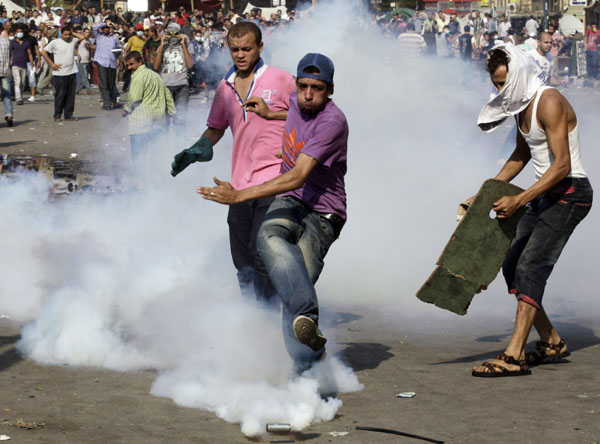Washington needs to rethink policies: Experts
Updated: 2012-09-15 08:07
By Zhou Wa (China Daily)
|
||||||||
Film about Islam sparks new wave of protests against US
The United States needs to rethink its policies toward the Islamic world, analysts said, as anti-US protests sparked by a film mocking Islam continued on Friday in the Middle East.
The new round of anti-US protests rang US policymakers' alarm bells, said Yao Kuangyi, former Chinese ambassador to Turkey and an expert on Middle East studies.
What happened in Libya and other countries in the Middle East demonstrates that US-led forced leadership reshuffles and military intervention in Arabic countries may result in hostility against the country. Wishing for democracy may not lead to democracy, he said.
 |
|
A protester tries to kick away a tear gas canister thrown by riot police near the US embassy in Cairo, Egypt, on Thursday. Egyptians took to the street to protest a US film they deemed insulting to their religion. [Photo/Agencies] |
Yao said he believes that Washington is faced with a dilemma when dealing with Middle Eastern affairs.
On one hand, it attempted to win support by backing a new and more "democratic" government in Middle Eastern countries. On the other hand, it cannot avoid the risk of being used by Islamic extremists during leadership reshuffles, Yao said.
Zhang Xiaodong, an expert on Middle East studies with the Chinese Academy of Social Sciences, said the US film that triggered anti-US protests may wield negative influence over its image in Middle Eastern countries, especially those where the "Arab Spring" took place.
Since the 11th anniversary of the Sept 11,2001, attacks on Tuesday, the US-made anti-Islam film has been fanning the flames of a new wave of anti-US protests in Islamic countries around the world, even though countries criticized the film and leaders called for restraint.
In Yemen, a group which organized anti-government protests that brought down the country's former president Ali Abdullah Saleh, called for countrywide demonstrations on Friday, one day after four people died in the capital, Sanaa, when police fired on protesters trying to storm the US mission.
In Egypt, protesters continued confronting the police. Roads leading up to the US embassy in Cairo were littered with stones after running battles on Thursday between police and protesters in which 224 people were injured, according to the health ministry.
In Iraq, hundreds of followers of the Shiite cleric Muqtada al-Sadr demanded the closure of the US embassy in Baghdad.
Thousands marched in the Shiite stronghold of Sadr City in northeast Baghdad and shouted, "No, no, to Israel! No, no to America!" and "Yes, yes for the Messenger of God".
In Jordan, Salafist militants said they planned to demonstrate outside the US embassy in Amman after the Muslim main weekly prayers.
Protests have also spread further afield, including Bangladesh, Iran, Iraq, Israel and the Gaza Strip, Kuwait, Sudan and Tunisia.
The protests reflect the Islamic people's deep-rooted distrust of the US, which has almost unconditionally supported Israel, said Zhang.
The differences between the US and Islamic countries in culture and religion also contribute to the distrust, he added.
Although Libya formed a new government after the death of Muammar Gadhafi, the country remains in disorder, a situation which al-Qaida exploits for its anti-US activities, Yao said.
The protests come as US and Libyan officials probe an attack on the consulate in the eastern Libyan city of Benghazi that killed US ambassador to Libya Chris Stevens and three other US officials on Tuesday.
There is growing speculation that the attack was the work of extremist militants. Some media see the ambassador's killing as a warning to Washington.
The murder of Stevens is a shocking reminder to US President Barack Obama that helping to overthrow governments does not guarantee stability in the region, said the London-based newspaper The Telegraph.
Obama, whose sights are fixed firmly on securing a second term, had hoped that the rest of the world would wait until after the election if it had to grow restless and demand his attention, but the anti-US protests mean Obama can put it off no longer, said The Associated Press.
The protests are testing the president's foreign policy skills and giving voters a pre-election view of how he handles a crisis, said the agency.
Meanwhile, United Nations Secretary-General Ban Ki-moon on Thursday condemned the trouble-making film as "hateful", calling for calm and restraint at a time of rising tensions, according to the Xinhua News Agency.
The secretary-general "condemns the hateful film that appears to have been deliberately designed to sow bigotry and bloodshed", said a statement issued on Thursday by Ban's spokesman.
The Muslim Brotherhood, Egypt's largest political group, has called for "peaceful protests" outside mosques across the country after noon prayers.
AFP and AP contributed to the story.
zhouwa@chinadaily.com.cn

 Relief reaches isolated village
Relief reaches isolated village
 Rainfall poses new threats to quake-hit region
Rainfall poses new threats to quake-hit region
 Funerals begin for Boston bombing victims
Funerals begin for Boston bombing victims
 Quake takeaway from China's Air Force
Quake takeaway from China's Air Force
 Obama celebrates young inventors at science fair
Obama celebrates young inventors at science fair
 Earth Day marked around the world
Earth Day marked around the world
 Volunteer team helping students find sense of normalcy
Volunteer team helping students find sense of normalcy
 Ethnic groups quick to join rescue efforts
Ethnic groups quick to join rescue efforts
Most Viewed
Editor's Picks

|

|

|

|

|

|
Today's Top News
Health new priority for quake zone
Xi meets US top military officer
Japan's boats driven out of Diaoyu
China mulls online shopping legislation
Bird flu death toll rises to 22
Putin appoints new ambassador to China
Japanese ships blocked from Diaoyu Islands
Inspired by Guan, more Chinese pick up golf
US Weekly

|

|






